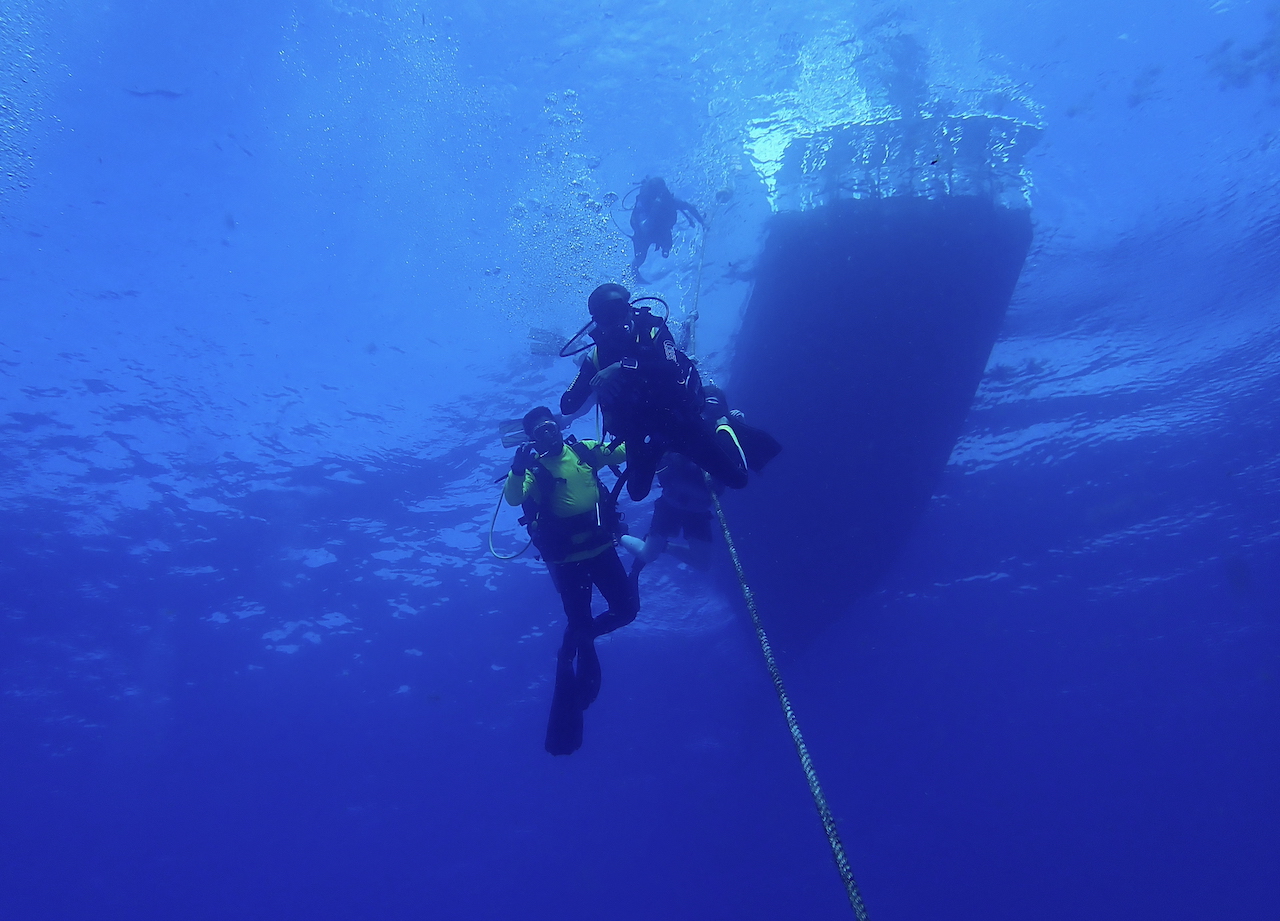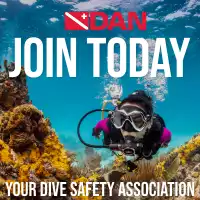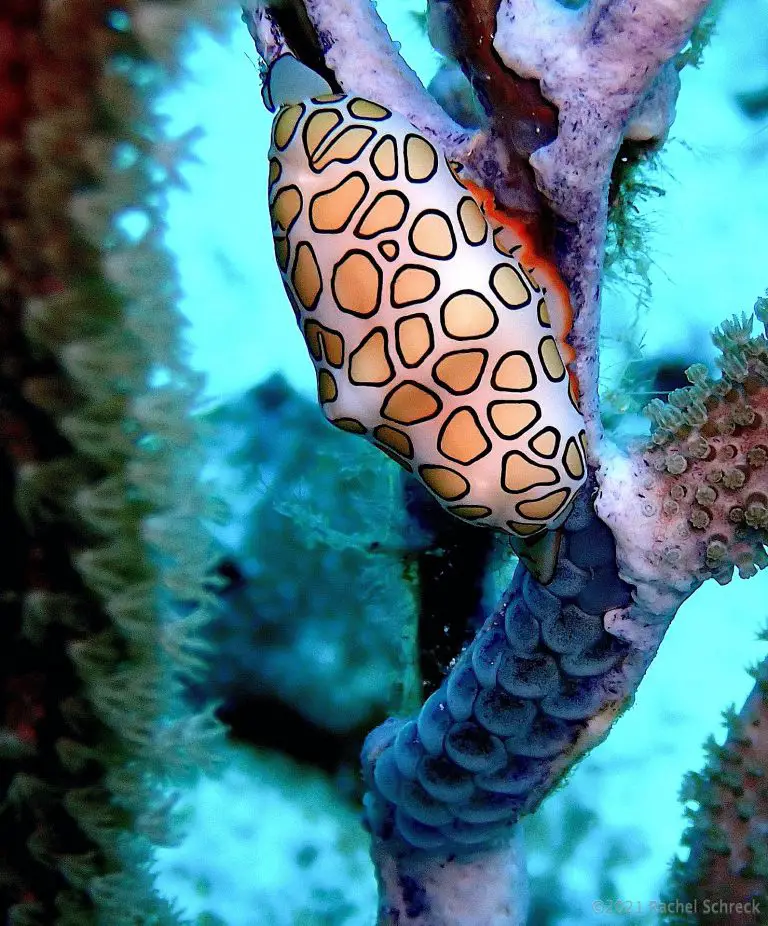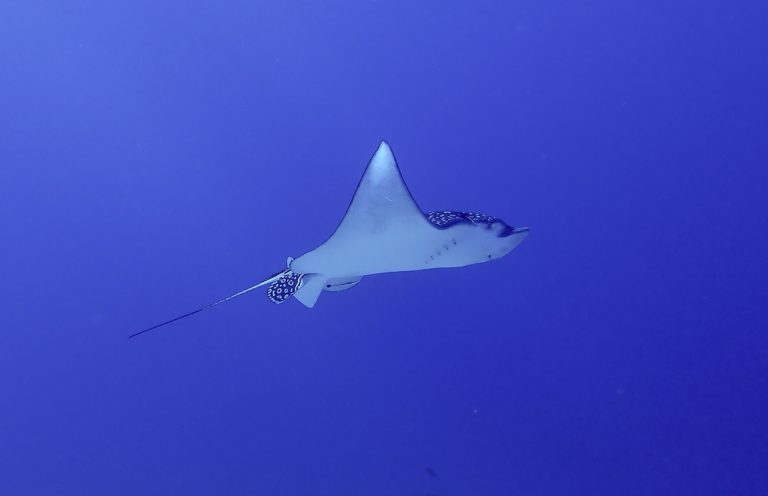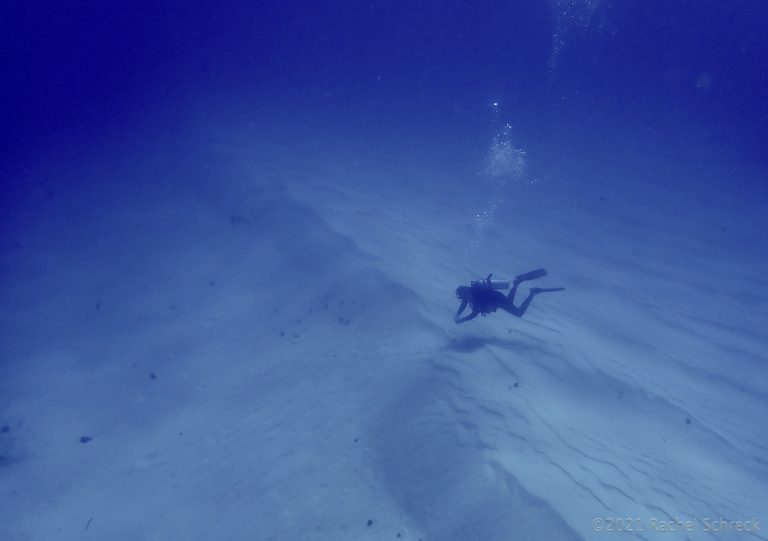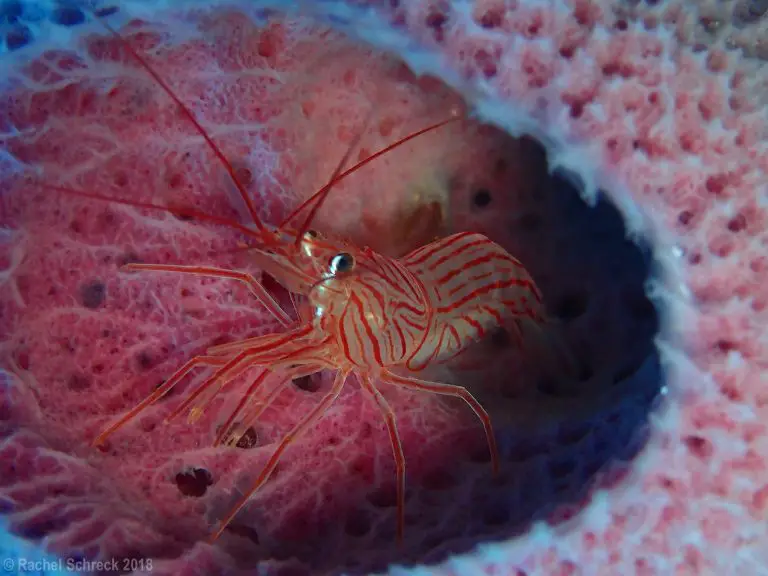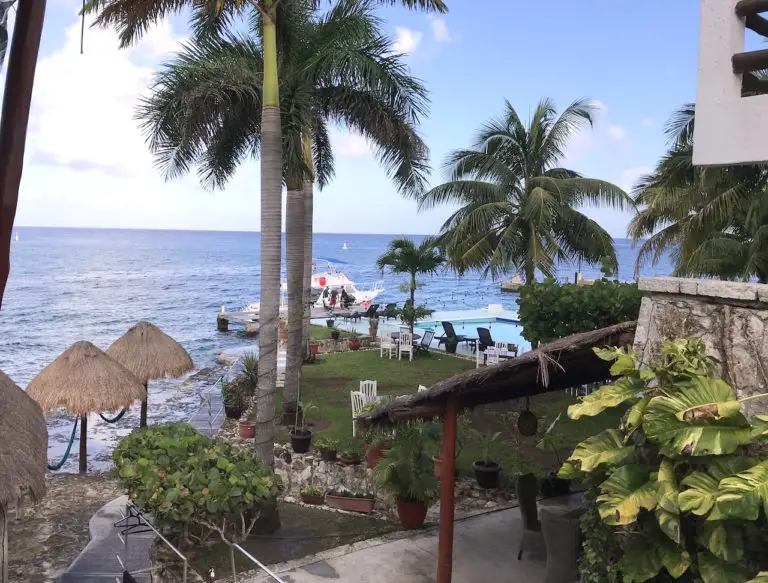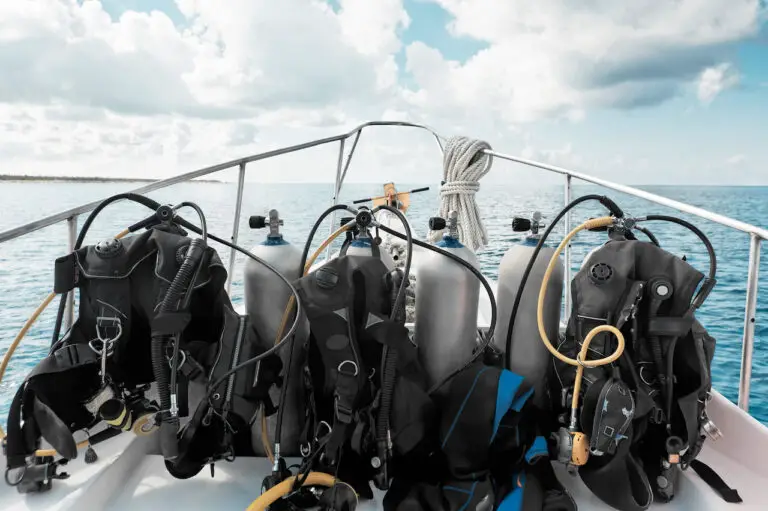Key Tips for Choosing Best Dive Shops in Cozumel
Understanding how to choose the best dive shop in Cozumel can seem overwhelming. With so many truly great dive masters, boat captains, dive operations, and dive packages, how do you narrow it down?
If you ask on social media, you’ll get 50 different personal referrals for each person’s favorite dive shop in Cozumel, and the thing is…they’re all right! As mentioned in my post on why scuba diving in Cozumel is so great year-round, the diving culture that infuses Cozumel is remarkable, which means a lot of high quality Cozumel dive operations, and a lot of friendly competition.
Personally, I lucked out when I started diving in Cozumel a couple of decades ago (yipes, that makes me feel old!). But it’s true – I have been a rabid Cozumel diver for a long time, and when I did my very first dive trip to Cozumel, I came with my home diving instructor and dive group, as many people do.
I went with their choice of Cozumel dive shop, of course, and luckily I have never had any reason to change it up.
So what if you don’t know where to start? Maybe you’re a new diver, or just don’t have any personal world-of-mouth recommendations for the best dive shop in Cozumel.
Start by considering some of your own diving vacation preferences. Then start by asking prospective dive shops in Cozumel some key questions that will help you find your perfect match.
Cozumel is home to well over 100 good-quality dive shops. If you don’t have a trusted personal recommendation, focus on the operators’ professionalism and commitment to safety equipment and protocols. Then narrow it down via features you specifically need like quality of rental gear, boats that suit your diving style, proximity to your hotel, specialty diving preferences, schedule, and lastly budget.
Like most Cozumel diving enthusiasts, I have a strong loyalty to my own favorite local dive shop that I’ve dived with (and trained for my divemaster certification with) for many many years. And other Cozumel divers have theirs.
You’ll read lots of passionate reviews from people insisting their favorite shop is THE best. As though it’s the absolute perfect choice for all divers in all circumstances.
But you’re looking for an operator that’s going to meet (or exceed) your scuba diving expectations so that all of your holidays are safe, fun-filled, and hassle-free.
Take a little time now to think through and recognize what your expectations and ideal dive days are in the first place, and then go from there.
Here are some easy tips to help you narrow down the most important features of a good quality dive shop, including suggested key questions to ask to help you select the best Cozumel dive shop for your needs and your scuba diving experience level.
*If you’re new to Cozumel diving, welcome! (or bienvenidos). Be sure to poke around the rest of the site.
There’s lots of good intro information on why so many people love diving here year-round, help on making sure you pack the right wetsuit and thermal gear, and tips to get into underwater photography in Cozumel. We also have several features on our unique local marine life you’ll see while diving in Cozumel – like the action during our local eagle ray season, Cozumel’s own splendid toadfish, when and where to see sharks, our incredible variety of local sea turtles, photo-filled posts on some of our favorite underwater macro critters, and many more.
Use the links, or search “diving” in the search bar (upper right) for more info to get you primed, packed, and ready for your trip.
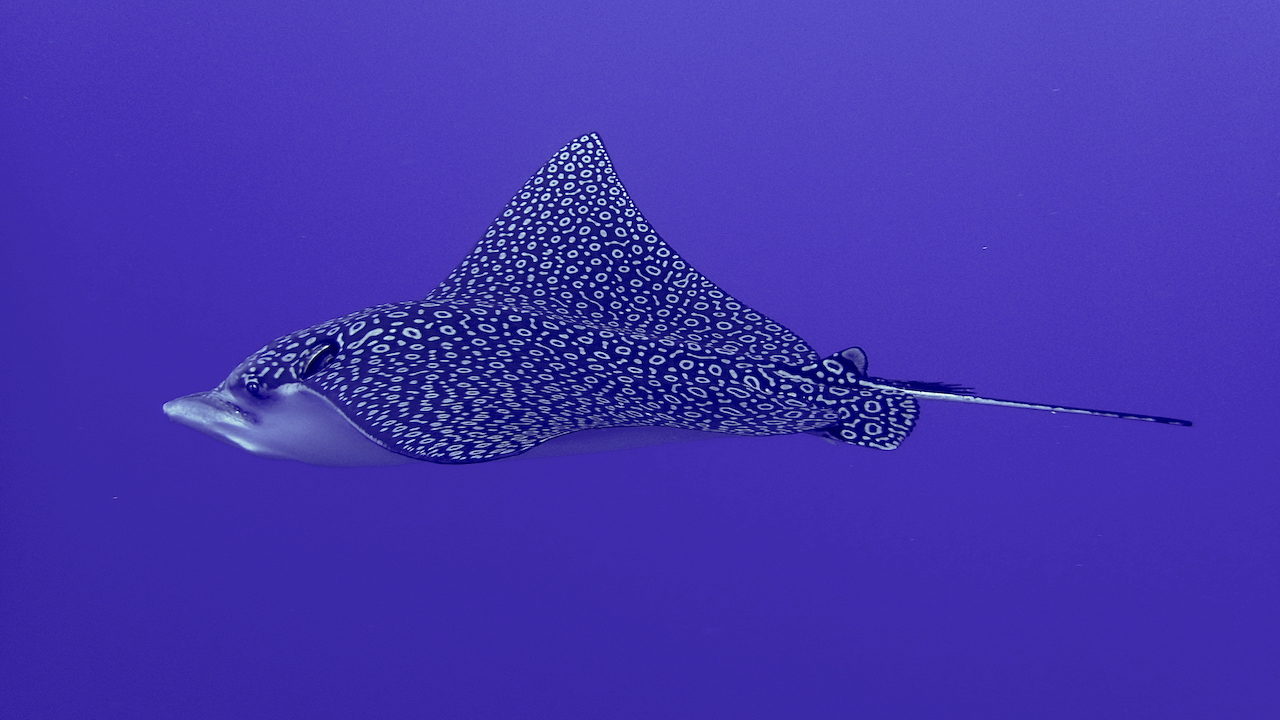
TL;DR: Quick Tips to Narrow Down the Pool of Excellent Dive Shops
- Try to get direct, personal recommendations from your dive instructors or dive friends that you already know and like
- Consider the choice in relation to which Cozumel hotel zone you’ll be staying in; the best dive resorts and hotels here have their own in-house dive services and Cozumel shore diving access, making things very easy logistically and adds accountability
- Go through the list below to remind yourself what questions to ask prospective Cozumel dive shops, especially regarding the diver safety protocols they follow and individual preferences you might be forgetting (or assuming are universal)
- Don’t use low pricing to be your top priority; budget has its place, but rock-bottom price could indicate a Cozumel dive shop that doesn’t carry the proper boat permits, operators insurance, etc. Focus on some of these other recommended screening questions first, and then maybe let price point break a tie
- Believe the fact that there are many excellent dive shops in Cozumel with great experience and lots of loyal, repeat customers. So any you choose will likely be a great and fun experience. The dive industry is not easy, and most dive professionals take things seriously, and do the work because they love and care about it. Their quality and trustworthy reputations are hard earned and well deserved. You really can’t go too wrong with the vast majority of dive shops in Cozumel.
Fore more in-depth info, let’s go back to our full advice on selecting the right dive shop for you – in Cozumel or anywhere – by going over some of these important considerations.
Non-Negotiable Features of a Quality Dive Shop in Cozumel
First we should start with an aspect of SCUBA that all divers care about in a potential dive company: SAFETY.
Diving is generally quite safe if you’re well trained and responsible. And then you also want your dive operator to have training and procedures and protocols in place to make the diving as risk-free as possible.
Does the Cozumel Dive Shop Adhere to Cozumel Marine Park’s Rules and Regulations
Confirm that your prospective dive shop has all the correct operating licenses and Cozumel marine park permits.
These are regulated (mostly) by the municipality and the national marine park’s organization, and help divers and residents know that all the Cozumel dive boats that are permitted to operate legally in the national marine park.
Check for this Authorized Operator decal on the dive boat in question:
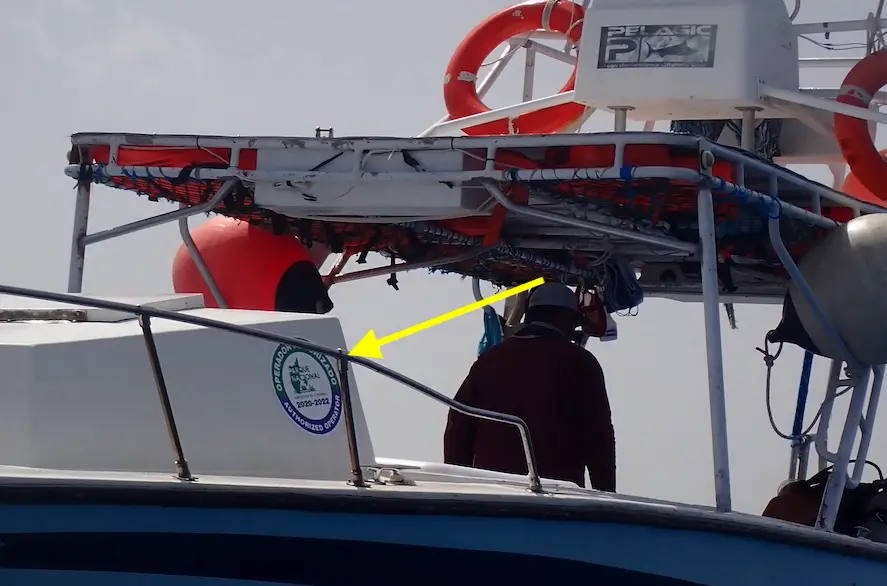
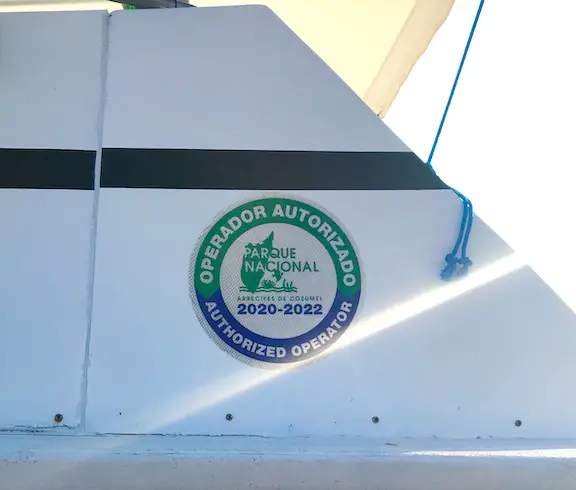
I totally relate to wanting to support the little guy, by the way, and know full well that some quality dive pros here might be struggling. But there are also many in that same circumstance that still honor the marine park rules and work hard to keep all their paperwork in order.
Your dive shop should also carry insurance, on their boats and for their dive instructors.
The Cozumel Marine Park has a permitting process for all dive guides, and also issues Marine Park daily passes for divers in the form of paper bracelets (or an annual card) to divers who use the park each day, to help offset its conservation and operating costs.
Make sure you pay your park fees to your shop, and that you get your daily bracelet in return.
Consider the Cozumel Dive Company’s Professionalism, Service and Attitude
The dive company and staff should provide quality service and attention before, during, and after your time on the dive boat. This includes the boat crew, the dive staff and interactions with the sales and reservations people, if applicable.
Any possible issues should be addressed quickly. The dive staff should be competent and well-trained to handle scuba emergencies.
Please do be cognizant of language barriers or simple misunderstandings which can sometimes grow into problems. Best rule of thumb is to give people the benefit of the doubt – they usually deserve it.
Similarly, if you’re reaching out to ask questions and potentially book your dives, remember the nature of the work. Most Cozumel dive shops don’t have someone manning the phone and email at all hours, so plan ahead and allow some lead time to hear back.
If you’re in Cozumel for scuba classes or other dive training, your instructor should have relevant experience and up to date certification credentials.
The dive staff should provide you with information about a new dive site prior to each dive.
Ideally you’ll be told the name of the Cozumel dive site, maximum depth, target length of dive, and the terrain you’ll encounter. They will often explain some of the more common marine life that you might see, and the signals for those animals, and should be able to answer any questions you may have.
ASK Cozumel Dive Shops About their Safety Protocols
Ask if the guides and/or instructors are certified and how long they have been teaching SCUBA.
Ask about their emergency protocol in the event of an emergency while diving, and what measures are taken to ensure safety of the students while they are being trained, and if they have relationships with the best local Cozumel hospitals for dive injuries.
And most importantly, remember that you are ultimately responsible for your own diving safety. Review your diver training materials so you remember the most important safety training of all – that of the certified diver, him/herself.
For the safest diving of all, please please be sure your DAN (Divers Alert Network) membership and insurance coverage are active before any dive trip.
Your DAN membership card is invaluable, and is well-recognized in Cozumel.
The most important piece of dive gear in your kit.
Diving Safety Items You Should Definitely Ask Cozumel Dive Shops:
Oxygen on Board for Diver Safety
A critical piece of safety and first aid equipment to have on a dive boat is Oxygen in a good tank that’s in working order.
Ask your prospective Cozumel dive operator if they always carry oxygen for first aid on all of their dive boats, and if the boat captain and dive masters know how to use it.
Once or twice, I’ve seen our dive boat called to help another boat in distress because they didn’t have enough oxygen (or maybe it was malfunctioning) while our boat did.
Of course there’s nothing wrong with needing and asking for help, but I’ve always been grateful and proud that ‘our guys’ were equipped and prepared to lend a hand in an emergency.
Should they ever need backup assistance, themselves, I have no doubt other Cozumel dive boats would respond in kind. It’s just that kind of place.
And please – needing oxygen or any other first aid on board has no reflection on your diving skills or experience. Nor on the shop’s safety record!
Half the time, the person needing oxygen may suffer from hypertension, and/or may be older or out of shape. Heart attacks or other maladies are rare, but seem more common than decompression illness.
So this is always a good question to ask.
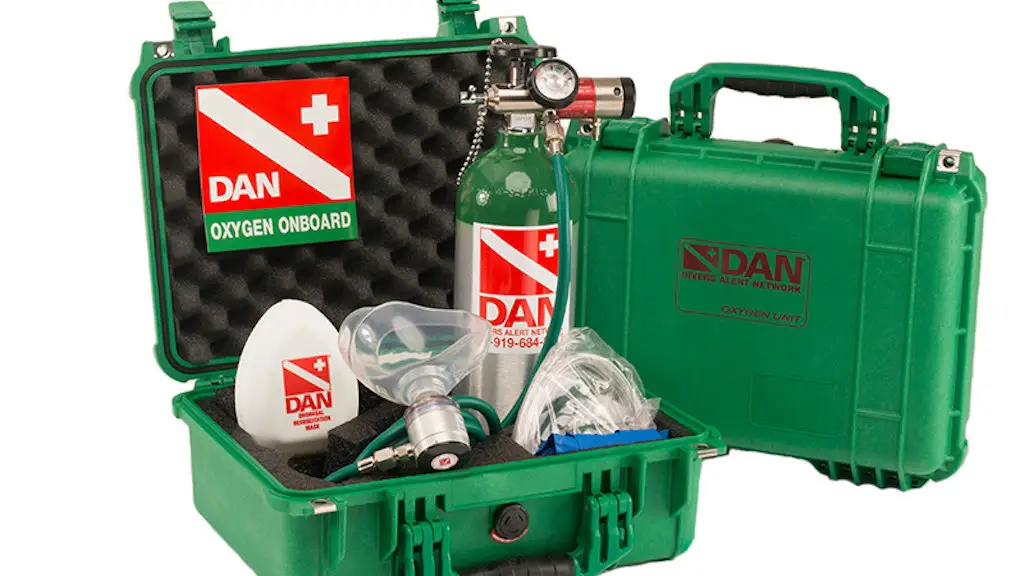
Your Cozumel Dive Shop Should Have an Emergency Radios
I think all/most do, in fact, but ask the question anyway.
Radios in Cozumel dive boats are utilized a lot everyday for general communication among captains.
First off, they’re essential if a serious diving accident or incident of decompression sickness occurs.
As the boat rushes to the nearest pier to get the injured party appropriate medical assistance, they can radio ahead for an ambulance to meet at the best spot, and take them to the right Cozumel hospital for dive medicine and hyperbaric treatments.
But that’s pretty much the worst case scenario. It doesn’t happen a lot, but when it does it’s great to see the communication in action.
Then, in typical day-to-day activities, local Cozumel boat captains use their radios to coordinate pickups, and helpfully tip each other off about any unusual currents or conditions in certain areas of the marine park.
They also sometimes need to assist each other in locating splinter groups of divers, as divers sometimes accidentally intermingle with other groups underwater and/or get caught in currents that have them surfacing a little off course from their DM and/or where the captain might have anticipated.
All good, and it’s not as scary as it sounds. But that’s thanks in large part to the radios!
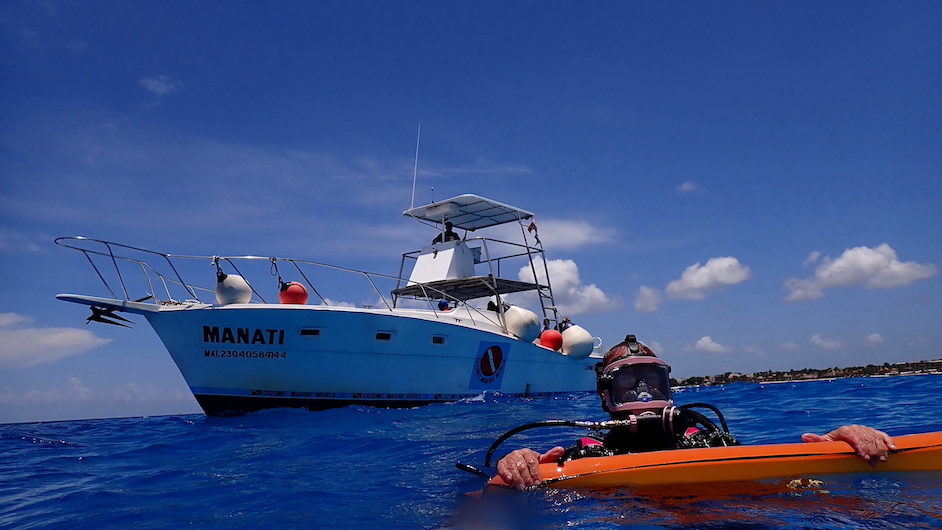
The robust diving community in Cozumel has friendly competition from time to time, but for the most part everyone on the water really helps each other and works together to make each dive day as fun and safe as possible.
Good Cozumel dive masters will include a reminder of your boat’s name, captain’s name, and radio channel before each dive. So do us all a favor and pay attention to your dive briefing.
Note: Many divers roll their eyes or talk through the dive briefing. Especially if they have a lot of experience. Not cool. Please just be respectful of your divemaster and your fellow divers who appreciate the information, and listen to your dive briefings.
First Aid Materials to Have on Board
Lots of dive accidents or injuries on a dive boat are not nearly as serious, but still happen.
Maybe you’re trying to remove a tank O-ring and catch yourself with the little sharp picker tool.
“Anybody have a band-aid?!”… is a fairly familiar refrain.
Or someone may slip and fall getting in or out of the boat at their dock, or if an unexpected wave rolls in and throws people off balance.
Ask whether you can expect them to have basic first aid materials and things like ice – that can help in a lot of circumstances.
Most seasoned divers travel with a small personal first-aid kit for their own dive bag, as well.
For example, I carry an old peanut butter jar (DIY dry box!) with a few zip ties, some first aid tape, extra O-rings, a couple of band-aids, some antesceptic gel, a couple of allergy pills, nail clippers, a travel toothpaste to scrub my mask, and a few other bibs and bobs.
As a certified diver, you are responsible for yourself, at the end of the day.
Fresh Drinking Water Should Be Standard on Cozumel Dive Boats
From maybe your first open water class you’ve been taught that proper hydration is one of the key ways to stay prepped and ready for diving, right?
Drinking plenty of water during your travels and on the day of diving can help a lot as a prevention against decompression illness – whether it’s an “undeserved hit” or not.
Ask your potential dive operators in Cozumel if they provide fresh purified drinking water each day.
Most do. But also these days most shops are doing their part cutting down on single-use plastic and providing purified drinking water in large coolers (think those large Gatorade jugs, e.g.) so try to be sure and bring your own reusable water bottle.
Some Cozumel dive shops hand them out for convenience (and a little smart branding/marketing).
Please take one and use it proudly. And frequently. Stay hydrated folks!
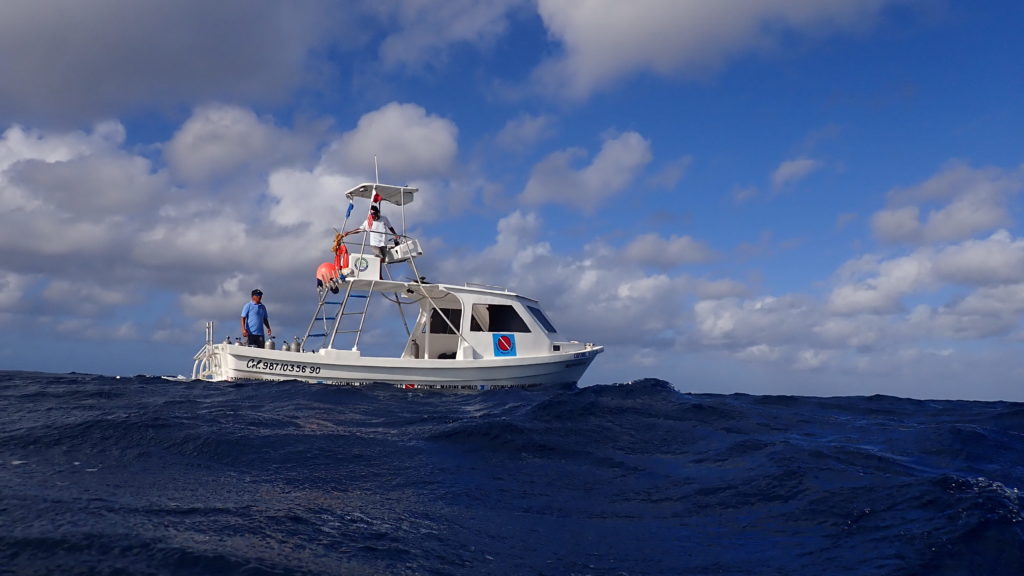
Other Features to Help Choose the Right Cozumel Dive Shop
OK, so you’ve realized that most of the dive ops you’re considering meet all the above criteria.
Still not getting a gut feeling on which Cozumel dive center to choose?
Here’s where your own personal preferences will come into play.
There are many other considerations when selecting a dive operator that is well suited to you and your ideal diving style.
Here are some of the most important, imo.
Location of the Cozumel Dive Operation in Relation to Your Hotel
Cozumel has lots of dive-friendly hotels with piers where various dive boats can pick up divers each morning.
If you appreciate convenience, it’s great when the dive shop you choose is located at your dive-focused hotel, or that your hotel have a good accessible pier area for meeting your chosen dive crew at the appointed time.
There are also lots of boats that gear up and have their passengers board at the marina prior to going out.
That’s cool too, but just bear in mind you’ll have to get a ride, take a taxi, or drive your own rental car there each time. It’s often well worth it, but just make sure you know what to expect.
And be forewarned: Some larger all-inclusive resorts in Cozumel have started implementing “pier fees” to the local dive ops if their customers are staying at that resort. Some are smallish – maybe $2.00US per day. But one resort’s new fee is a whopping $25/bucks each day. (Wha??….)
So again, just ask first. Make sure your hotel or resort is also a good and dive-friendly venue before you book it.
Check out some of the most diver-centric hotels in Cozumel here.
Do You Need to Rent Dive Gear in Cozumel?
In general, dive equipment like regulators and B.C.D.s are considered life safety equipment. As such, reputable Cozuml dive shops will regularly and carefully clean and inspect their rental gear, and take items out of the rotation if they need servicing, or they’re past their prime.
Make sure if you need to rent dive gear, that the local shop has what you need, and at reasonable rates. Then check it thoroughly upon arrival to make sure things are in working order, and fit you properly.
The dive gear you’re given doesn’t need to be brand new (good gear actually lasts a good long time), but should be of good quality and well maintained.
If you’re renting a mask, plan ahead and ask them if they have a few styles you can try on before heading out. Masks can sometimes be hard to fit our various individual faces. One that’s ill-fitting or has any gaps may lead to slight leaks or fogging.
(After years of not quite getting it right, this is now my preferred dive mask. It’s got a comfortable fit, and seems to suit a wide array of people – plus if you need corrective Rx lenses in your dive mask, you can order and insert them into this mask yourself, when needed. Huge bonus.)
That all said, it’s always best to visit your LDS (local dive shop) and try masks on to find the best fit.
For more on fitting your first scuba mask and what other dive equipment you should pack for Cozumel, head over to this dive equipment post next.
Do You Have Any Mobility Challenges or Needs?
Typical diving entry and exit maneuvers can be tricky for people who have injuries, have recently had surgery, or other reasons.
If that sounds like you, ask about the relative ease of getting on and off the Cozumel dive shop’s boats.
Everyone involved wants to get you on, off, and back on the boat again safely, and in a comfortable situation where you can enjoy the diving. But again, unless you’re a repeat customer, the staff can’t know your particular needs beforehand, so it’s important to communicate well.
For example, a few months ago, my friend came to Cozumel for some diving but had recently had knee surgery.
She was cleared to dive by her doctor, but knew she might have some trouble climbing the boat ladder to get back on board. We made sure that we could get on a boat we knew would have a pretty stable ladder with good hand rails.
You can also take your scuba gear off in the water and hand it up to the dive boat’s mate before climbing up. This is fairly common, and is far preferable than hiding any mobility issues you might be having, only to strain or re-injure yourself.
Boarding and disembarking the boat can also be easier at certain Cozumel piers than at others. If it’s a concern, just ask beforehand. There is a solution for almost everything here!
Consider Your Need for Shade Cover on the Dive Boat
Sometimes people swear by “small, fast boats” and they definitely are fun and can get you out on the water fast – and back home for lunch faster, too. But that may come with other minor sacrifices.
Some larger Cozumel dive boats still keep to small groups, but they often have more shaded areas, an easier bathroom (or a bathroom at all…), and some space to keep your bags in a dry area, etc.
If you can’t tolerate lots of sun, like some ease when getting on and off the boat, or you prefer a steadier ride in general, you might well prefer a larger dive boat.
If you love backroll entries, are pretty low-maintenance, and don’t need to move around or talk much, a cool speedy little boat might be better for you.
And if you’re like many of us – either is fine, as long as you’re going diving!
(Either way, it’s smart to have a small sturdy dry box or good dry bag for your phone and valuables – some of the small Cozumel dive boats don’t have dry storage space. Many do, but some don’t.)
Do You Have Expectations for Underwater Photography Needs?
I take a lot of underwater photos in Cozumel, and I use a pretty minimal setup.
Some underwater photographers, even hobbyists, have very large rigs and sometimes assume their boat will have a table for setting up and a large fresh water rinse tank that can accommodate their camera (and everyone else’s…).
Think about your needs and expectations and just ask first! Most will work with you to get you what you need, but they also can’t read everyone’s mind.
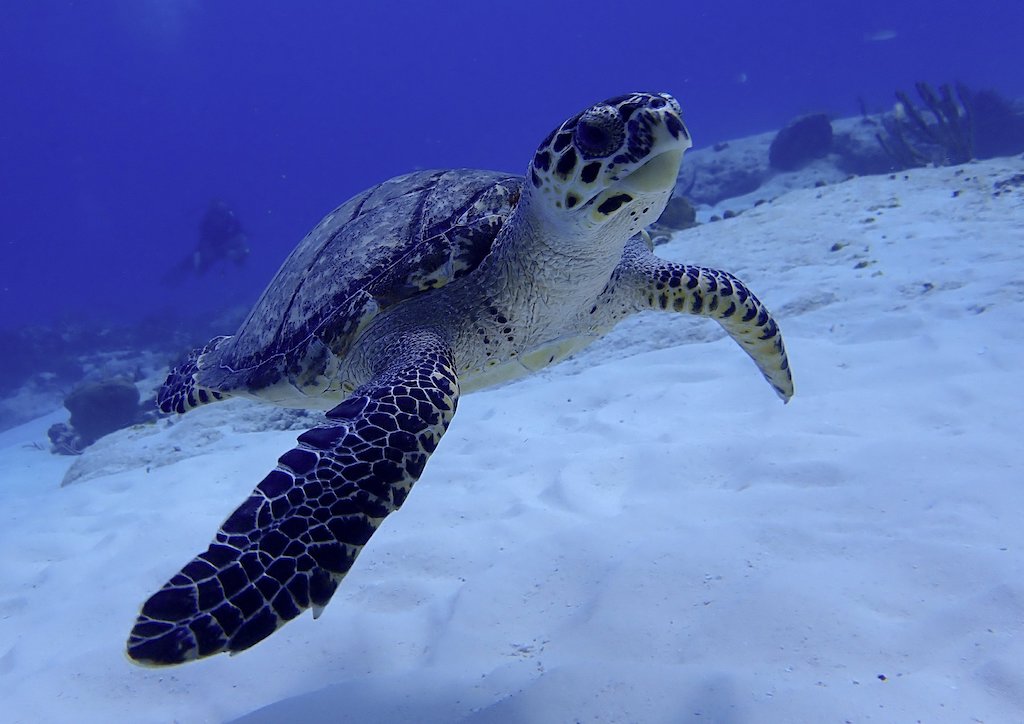
Signature Dive sites in Cozumel – Food for Thought
If you read some of the other posts here on cozumel diving and tips for local underwater photography (namely the cool critters you can find – see more HERE), you know we bristle a little bit when people have it in their head that they only want to dive at certain dive sites in Cozumel.
There are colorful coral reefs running up and down our national marine park, and sometimes a certain beloved dive site is closed due to high winds, or maybe due to the Cozumel marine park’s new practice of “rotating” a few sites to be closed to diving for a few months at a time.
Granted, if you have your heart set on diving, say, Santa Rosa Wall (one of the most popular dive sites frequently written about in Cozumel), it can be a bummer if it happens to be closed that day.
On the other hand, you can have an equally awesome dive on any number of dive sites, like Columbia Deep, San Francisco Wall, or Punta Tunich. You just might not have read about them in the latest issue of your favorite dive magazine.
I get it – when I go to a new destination dive spot, I get my heart set on certain dive sites, too!
But I also trust the local DMs and other repeat clientele for their knowledge and expertise. If a site is inaccessible on a given day, I’m now of the strong mind that it must be for a good reason.
Each Cozumel dive operator has to follow the marine park rules on closings, and captains confer with each other sometimes if they know a particular dive site might have a more dangerous current running that day.
If your dive op goes against these advisements, that’s actually kind of a bad sign, in my opinion.
Try not to pressure them. If a dive boat allows divers on a site that’s been closed by the Cozumel marine park officials, their permits could be revoked! It’s not worth it to them, nor to you if the conditions are not appropriate that day.
The best dive site is the one you come back from.
Just go with the flow. Most long-time divers here when asked where they’d like to go that day often answer, “underwater.”
Meaning, all the sites here are good and have lots to offer.
There are several good shallow dive sites, and several great deeper sites. Many that offer swim-throughs. Many known to be especially great for finding macro photo subjects. Etc.
And you know what?
Odds-wise, I’ve seen far more eagle rays, nurse sharks, and sea turtles on our favorite shallow dive sites in Cozumel, and the occasional splendid toadfish or nudibranch out on the deeper wall sites.
You really just never know.
Tell your dive master and fellow divers the kinds of coral formations you love, or if there are certain marine animals you hope to encounter, and everyone will usually work together and pick a great dive site. (They’re all pretty great for various reasons).
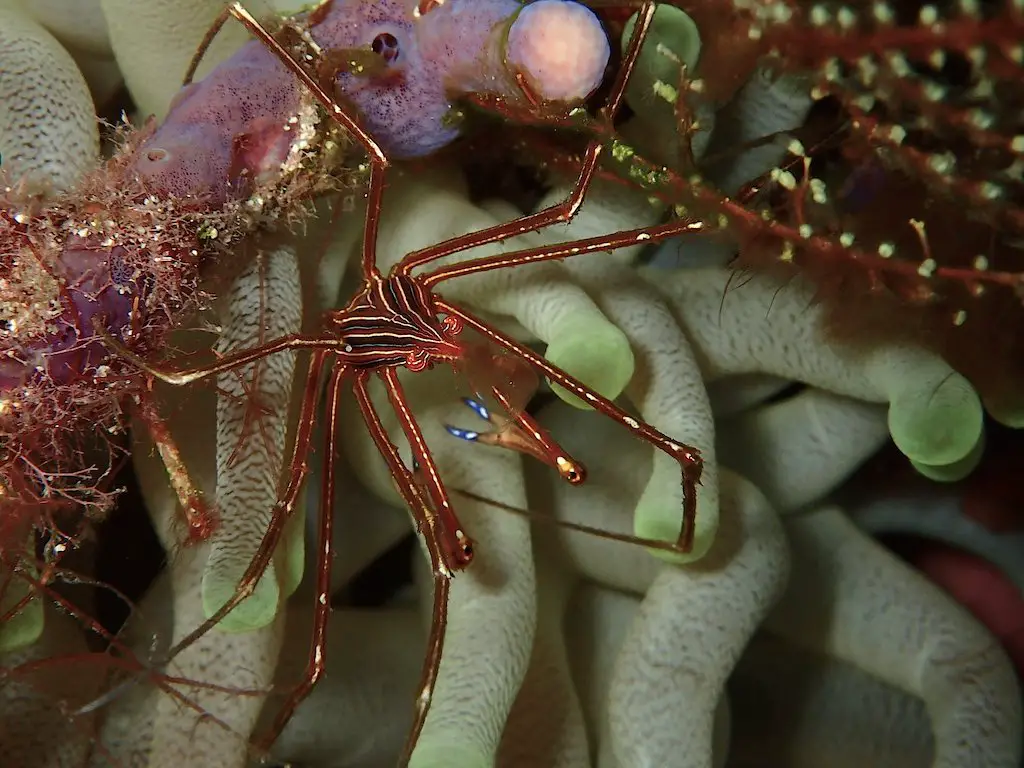
Are You Expecting to Dive Your Full Tank and/or Do More Than 2-Tank Days?
As a general rule, most dive centers in Cozumel tend to have all boats go out for two-tanks at around 8am.
Some other shops offer outings at different times of day, or staggered during the day. Some have a twilight boat dive several times a week, others only arrange twilight or night dives by demand.
If you know you and/or your group want to do 3-tank dive trips every day, or dive in the afternoon instead of the morning, etc., definitely ask ahead.
If you have a bunch of dive buddies with you, it’s often a great set up to find a shop that can get you on your own small boat and a dive master who’s well-suited to your particular style and experience level.
Without other customers on the same boat, they will have more flexibility to fulfill your ideal diving vision and keep their other paying clients happy as well.
The more you identify your expectations and communicate them ahead of time, the better you’ll be when finding the right Cozumel dive company for you and your dive group.
But I Want to Dive My Tank…
The same goes for bottom time expectations.
Cozumel dive shops tend to be pretty generous concerning dive times, from my comparative experience in other dive destinations.
There’s often a reasonable expectation on the amount of bottom time allowed. It varies by shop, but is often a full 1 hour or 700 pounds of air, whichever comes first. (Or unless an eagle ray shows up at minute 59, and then all bets are off…).
Advanced divers of course don’t love coming up “early” with over 1,000+ pounds of air in their tank. And if you have the dive boat to yourself, that can often be accommodated.
But newer divers or those with poorer air consumption don’t love waiting around and/or having a 2 hour surface interval between dives.
Compromise is key, here.
If this is a deal-breaker and/or your primary criteria on your diving vacations, be sure to express it before hand and try to get grouped with some divers of your same skill level.
In that case, you can find certain shops here that will totally let you dive your tank. Some even provide 100 steel tanks and let you have at it! (they also tend to cost a bit more, as they should.)
You can always arrange for a private boat (see above) for your group so you’re free to go more at your own pace and schedule.
Do You Like to Night Dive as Much as Possible?
If you’re a big fan of the night dive, ask ahead of time if your prospective Cozumel dive center can accommodate your expectations.
Sometimes, this is also a huge differentiator when choosing the best Cozumel dive hotel, also.
For example, several of the traditional diver-centric hotels on the island are well situated to allow for lots of shore diving, including night dives for you if you’re staying at one of them.
With safe shore entry points and good information on their house reefs and/or local terrain, you can really get in more night diving if that’s one of your favorite things to do on a dive trip.
Budget and Price Comparison Among Cozumel Dive Shops
Diving can be quite expensive, in general, no matter where you go.
In Cozumel the prices are pretty gentle compared to some other world-class destinations.
It’s important that the shop you choose is within your budget so you don’t experience sticker shock but as mentioned earlier, scuba diving is not an activity where you want the cheapest possible services, either.
Sometimes that means spending a little extra money to ensure you get what you need.
That said, there are certainly some places which offer very affordable rates for their services.
As a general rule, most dive centers in Cozumel tend to charge less than $100 per two-tank outing – typically around $75-100, plus tips for the divemaster and crew (see our post on tips and gratuities, here).
There are also local operators that may offer package deals, seasonal deals, and less expensive shore diving, etc.
It’s important, though, that you acknowledge the level of service and other accommodations you want.
Do you want more individual attention than a group diving experience? Then you should inquire about getting a private dive master (it’s not that much more money but can make a massive difference in safety and enjoyment. For everyone involved.)
Do you want “valet” dive services where they rinse and store your gear overnight between your days of diving during the week? Then ask first, because not all shops work that way (and lots of divers don’t want that – they want to be responsible for their own equipment).
These things are different in different places all over the world, and often considered “extras.”
It’s your time and your vacation, so treat yourself right, but communicate your expectations and try to keep perspective.
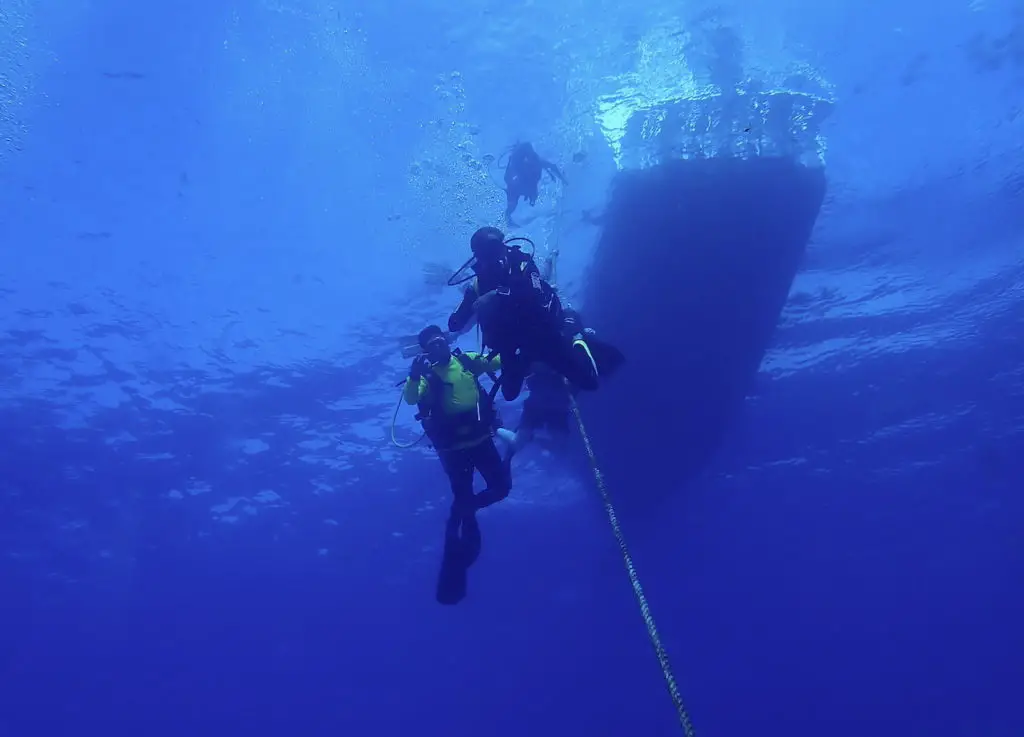
Seek Personal Experience and Word-of-Mouth Recommendations
Ask around for solid word-of-mouth recommendations from fellow divers you know and trust. (Here’s mine.)
Cozumel attracts scuba divers from around the world, and chances are you know someone who has dived here before.
Ask your past instructors or other experienced dive buddies you know to see if anyone you know can give personal recommendations.
Check out various Cozumel dive shops’ social media pages for a sense of how their customers feel about them, or their websites for testimonials of past clients — this can help narrow it down.
Do a few searches on other dive-related social media groups that you belong to for help.
For example, if you’re a woman, you might want to do a search in the FB group “Scuba Women” for recommendations, or even information specific to the place that will help you pack right and get the most out of your stay.
These methods might help you really tease out features that are specific to your scuba diving likes and dislikes – or include answers to questions that you might forget to ask.
There are groups for solo travelers, too. Or dive groups that might cater to families with kids, or divers with disabilities (search for great organizations like Diveheart, or Wounded Warriors.)
Picking Among the Top Dive Shops in Cozumel
As with many aspects of travel, planning is key leading up to your dive trip.
If you’re new to diving in Cozumel, often finding the one that’s best-suited to you and your skill level might seem hard. Especially if you don’t yet have a high experience level.
Choosing the right dive shop for you in any destination should take some consideration and assessment. But once you have it narrowed down to a few good options with high experience level and quality dive guides, then you’ll be on your way to having a great experience.
Thankfully, Cozumel’s inherent diving culture means there are countless skilled dive masters and instructors that can guide your diving in one of the best scuba diving destinations in the world, and look out for you while you’re there.
But never forget – you’re the one with the Certification-card!
You are ultimately responsible for yourself. Half the battle is keeping your skills sharp and taking a refresher class if you’ve gone more than a year or so (at least in the early years).
Also, inspect all of your dive gear and review our diver safety items packing list here, if it’s been a while since you’ve been in the water.
Finally, plan to do an initial shore dive in Cozumel to get your weights sorted out and re-familiarize yourself with your gear, etc.
At the end of the day, almost any dive operator in Cozumel that has its licenses and insurance up to date is going to show you a good and safe time.
And teach you even more about diving in this awesome and fun place.
So, it’s really just a matter of evaluating your options and picking the Cozumel dive shop that’s right for you.
We hope that this fairly thorough guide helps you remember your particular preferences, and smart questions to ask to make the right choice when you’re deciding on a high quality and safe dive shop for your next trip, no matter where in the world you’re going diving.
And again – don’t forget the diving and trip insurance! That’s the safest move of all!
The most important piece of dive gear in your kit.
Consumer Affairs' Top-3 Travel Insurance program.
- Free quotes
- Accredited by Better Business Bureau (US)
- Various levels of coverage, per need
- Not for Diving!
- For SCUBA diving coverage, read more about DAN insurance

